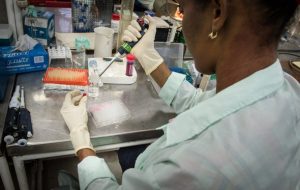TechInAfrica – Last week, the first cohorts of the upcoming South African and Zimbabwean biotech startups were granted the opportunity to pitch their initial innovations in Cape Town. As part of the BioCiTi, OneBio, and TechVillage boot camp program, the initiatives are supported by OneBio, an early-stage biotech investment fund, and BioCiTi, a biotech incubator established by the Cape Town Innovation and Technology Initiative.
Since May, each participant joined several 3 1 week intensive boot camps where they were trained with the industry experts and having a thorough conversation that would nurture their knowledge and insights. In between the periods during the boot camps, the startups also took part in digital workshops and coaching sessions.

Michael Fichardt, an entrepreneur, technologist, and OneBio co-founder, who spoke to ITWeb on the event, noted there are 3 key reasons why programs like these are very crucial. Fichardt further elaborated, “For SA to have a thriving biotech ecosystem, we believed three key things were missing. Firstly, there was no independent lab facility available for biotech startups to tinker, play and build products. Secondly, there was very little investment capital for early-stage startups. And lastly, there were no incubation or training programs for biotech startups.”
The “demo day” was the culmination of a training program spanning over 3 months. Each of the 9 ventures was given the time to pitch their ideas, elaborate on how their concept would fit into the market, and design their plea for funding, assistance in accessing markets or networks, and requesting for support and mentorship in the business field.
Included in some of the ventures is a company looking to redefine the perceptions of food by producing the world’s first dairy alternative from insect larvae to a brand that is working to restore and sustain farmland soil fertility, along with others. Thus, this provides an interesting perspective on the future of biology tech in Southern Africa.
These are the 9 participating startups which were chosen from a pool of 50 applicants, as listed below:
CapeBio Technologies
An applied genomics company that designs and develops life science research biologics, obtaining their source from the African indigenous biodiversity hotspots.
Gourmet Grub
The world’s first dairy alternative made from insect larvae.
MyBiome
MyBiome is the first in the country to offer microbiome banking and autologous encapsulated transplants. It specialized in things relating to the human gut microbiome.
PharmaHealth Technologies
A platform intended for clinical trials and patient engagement with the aims to promote ethical and patient-centric biomedical findings.
Tryad
Has the objective of a viable alternative to the synthetic indigo dye used in denim coloring. Microorganisms are the main starting compound to produce the natural indigo dye.
WNNR Biotech
A company that manages microbial ecosystems and focus on restoration maintaining of farmland soil fertility.
My BluePrint
A healthcare data aggregator on the lookout on developing individualized treatment plans and enabling more effective and efficient healthcare provision.
D Chem Group
Developer of innovative and affordable cleaning products. Their products are consist of cleaning utilities that strictly aim for the innovative and affordable range.
AlphaKymeric
Using plants to design proteins and metabolites that are utilized in the agriculture, health, and research fields.
Seeing how much the invention during the span of decades had been happening, just like the start of the computing industry, when computers were created in the size of control rooms, and a clunky machine at that, to how the development of those inventions had delivered us the computer, laptop, and to even smaller operating machine like android, had totally changed the game, by putting all these tools in the hands of people.

Fichardt thought about these similarities that started reaching the industry of the biotech field. Seeing how efficient the processes are becoming, the cost is dramatically reduce in recent years, so that means it’s now possible for biotech companies to experiment with their field, and not to be afraid of being imaginative.
Even for the next 20 years, by using biology, people would be able to change or alter most of the existing processes distributed all around the world. These alterations, then, in turn, will bring up an exciting revolution right in this space, as the knowledge of research and ideas are being transferred into commercial companies.
Source: Itweb.co.za


